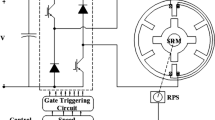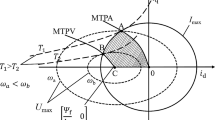Abstract
In practice, inverter dead time and digital signal processing delay are influential factors in classic predictive control performance. In this paper, delay compensation in finite-set model predictive current control (FS-MPCC) and inverter dead-time compensation in deadbeat predictive control are considered to improve permanent magnet synchronous machine control steady-state error, current and torque ripples, reduce the computational burden, correct inverter dead time-induced deviation, and reduce the sensitivity of parameter uncertainties. Deadbeat control uses a space vector modulation (SWM) block and converts the controller output voltage into duty cycles imposed on the inverter ensuring a fixed inverter switching frequency as opposed to FS-MPCC, which uses a finite set of switching states with a variable switching frequency (without modulation). The second approach looks at how a Takagi–Sugeno fuzzy logic speed controller (TS-FLC) can be applied to operate an intelligent system, offering a great current reference, which is crucial for the design of the FS-MPCC cost function and the deadbeat inner-loop control. A speed estimation observer based on a model reference adaptive system (MRAS) is suggested. By eliminating the encoder or speed sensor, the observer improves system reliability, boosts control performance, and reduces costs. The chosen FS-MPCC and deadbeat controller will be built and used in the laboratory utilizing DSpace.1104. The experimental results comparison shows that both FS-MPCC and deadbeat can be well applied to the PMSM driving system with good speed tracking performance. However, the FS-MPCC can achieve less harmonics in the stator currents and shows advantages in smaller ripples in the mechanical torque.






















Similar content being viewed by others
Abbreviations
- \({\nu }_{sd}\),\({\nu }_{sq}\) :
-
Dq-frame stator voltages
- \({v}_{sd}^{p}\),\({v}_{sq}^{p}\) :
-
Stator voltage predictions
- \({\widehat{v}}_{sd}\),\({\widehat{v}}_{sd}\) :
-
Stator voltage estimates.
- \({v}_{sd}^{DT}\),\({v}_{sq}^{DT}\) :
-
Dead-time stator voltages.
- \({v}_{dc}\) :
-
DC-link voltage
- \(\Delta V\) :
-
Average voltage distortion
- \({I}_{sa}\), \({I}_{sb}\),\({I}_{sc}\) :
-
Stator currents in abc-frame
- \({\iota }_{sd}\),\({\iota }_{sq}\) :
-
Stator currents in dq-frame
- \({\iota }_{sd}^{*}\),\({\iota }_{sq}^{*}\) :
-
Reference stator currents in dq-frame
- \({\iota }_{sd}^{p}\),\({\iota }_{sq}^{p}\) :
-
Predicted stator currents in dq-frame
- \({\widehat{\iota }}_{sd}\),\({\widehat{\iota }}_{sq}\) :
-
Estimated stator currents in dq-frame
- \({\varphi }_{sd}\),\({\varphi }_{sq}\) :
-
Stator flux linkage in dq-frame
- \({\varphi}_{PM}\) :
-
Rotor flux linkage
- \({\Omega }_{r}\),\({\Omega }_{r}^{*},\widehat{{\Omega }_{r}}\) :
-
Real, reference, estimated speed
- \({e}_{\Omega }\) :
-
Speed error
- \({T}_{r}\) :
-
Mechanical torque
- \({R}_{s}\) :
-
Resistance
- \({T}_{e}\),\({T}_{e}^{*}\) :
-
Real and reference electromagnetic torque
- \({L}_{d}\),\({L}_{q}\) :
-
Inductance
- \(J\) :
-
Moment of inertia
- \(f\) :
-
Friction
- \({s}_{sd}^{p}\),\({s}_{sq}^{p}\) :
-
Predicted Rectifier dq-axes switching signals
- \(p\) :
-
Number of pole pairs
- \({T}_{s}\) :
-
Sampling time
- \(g\) :
-
Cost function
- \(F\) :
-
Weighting factor
- \({t}_{DT}\) :
-
Dead time
- \({K}_{1}{, K}_{2}\) :
-
MRAS gains
- \({G}_{1}{, G}_{2}{, G}_{3}\) :
-
FLC gains
- FOC:
-
Field-oriented control
- DTC:
-
Direct torque control
- DPC:
-
Direct predictive control
- FS-MPCC:
-
Finite-set model predictive current control
- MRAS:
-
Model reference adaptive system
- TS-FLC:
-
Takagi–Sugeno fuzzy logic controller
- THD:
-
Total harmonic distortion
References
Sellali M, Betka A, Drid S, Djerdir A, Chrifi L, Mourad T (2019) Novel control implementation for electric vehicles based on fuzzy -back stepping approach. Energy. https://doi.org/10.1016/j.energy.2019.04.146
Chengxing L, Haisheng Y, Jieru C, Tao X, Hechao Z, Huilue J, Zhaowen Z (2019) A hybrid coordination controller for speed and heading control of underactuated unmanned surface vehicles system. Ocean Eng 176:222–230. https://doi.org/10.1016/j.oceaneng.2019.02.007
Mingfei H, Yongting D, Hongwen L, Wang J (2022) Torque ripple attenuation of PMSM using improved robust two-degree-of-freedom controller via extended sliding mode parameter observer. ISA Trans. https://doi.org/10.1016/j.isatra.2022.01.033
Abdelrahem M, Hackl CM, Kennel R (2016) Simplified model predictive current control without mechanical sensors for variable-speed wind energy conversion systems. Electr Eng. https://doi.org/10.1007/s00202-016-0433-y
Benakcha M, Benalia L, Ammar A, Bourek A (2018) Wind energy conversion system based on dual stator induction generator controlled by nonlinear backstepping and pi controllers. Int J Syst Assur Eng Manage. https://doi.org/10.1007/s13198-018-0734-9
Yaramasu V, Wu B (2017) Model predictive control of wind energy conversion systems. Electric Electron Eng. https://doi.org/10.1002/9781119082989
Torres J et al (2019) Direct power control strategy for an axial flux permanent magnet synchronous machine. Electr Eng. https://doi.org/10.1007/s00202-019-00889-4
Xiaoguang Z, Liang Z (2018) Model predictive current control for pmsm drives with parameter robustness improvement. IEEE Trans Power Electron. https://doi.org/10.1109/TPEL.2018.2835835
Hu M, Yang F, Liu Y, Wu L (2022) Finite control set model-free predictive current control of a permanent magnet synchronous motor. Energies 15:1045. https://doi.org/10.3390/en15031045
Fangbo X, Zhangyong C, Yong C, Haifeng L (2022) A finite control set model predictive direct speed controller for PMSM application with improved parameter robustness. Int J Electr Power Energy Syst. https://doi.org/10.1016/j.ijepes.2022.108509
Zhiqiang W, Anbo Y, Xinmin L, Guozheng Z, Changliang X (2019) A novel current predictive control based on fuzzy algorithm for PMSM. IEEE J Emerg Select Top Power Electron. https://doi.org/10.1109/JESTPE.2019.2902634
Saberi S, Rezaie B (2022) Robust adaptive direct speed control of PMSG-based airborne wind energy system using FCS-MPC method. ISA Trans 131:43–60. https://doi.org/10.1016/j.isatra.2022.04.035
Wang Y (2017) Deadbeat model predictive torque control with discrete space vector modulation for PMSM drives. IEEE Trans Ind Electron 64(5):3537–3547
Liu X, Wang D, Peng Z (2016) Improved direct finite-control-set model predictive control strategy with delay compensation and simplified computational approach for active front-end rectifiers. In: Cheng L, Liu Q, Ronzhin A (eds) Advances in neural networks, lecture notes in computer science. Springer, Cham. https://doi.org/10.1007/978-3-319-40663-3_26.
Young HA, Perez MA, Rodriguez J (2016) Analysis of finite-control-set model predictive current control with model parameter mismatch in a three-phase inverter. IEEE Trans Industr Electron. https://doi.org/10.1109/TIE.2016.2515072
Zhang X, Cheng Y (2020) The optimized model predictive control with dead-time voltage vector for PMSM drives. IEEE Trans Power Electron. https://doi.org/10.1109/TPEL.2020.3012985.
Jingzhe G, Shaobin L, Yongxiang X, Jibin Z (2019) Time-delay compensation method in PMSM servo system based on predictive current control with sensitivity analysis. In: IEEE 22nd international conference on electrical machines and systems (ICEMS)—Harbin, China. https://doi.org/10.1109/ICEMS.2019.8922134.
Falkowski P, Sikorski A (2016) Dead-time compensation in a new FCS-MPC of an AC/DC converter with a LCL filter. In: 13th selected issues of electrical engineering and electronics (WZEE). https://doi.org/10.1109/wzee.2016.7800201.
Guo L, Jin N, Gan C, Xu L (2018) An improved model predictive control strategy to reduce common-mode voltage for 2-level voltage source inverters considering dead time effects. IEEE Trans Ind Electron. https://doi.org/10.1109/tie.2018.2856194
Sun X, Wu M, Lei G, Guo Y, Zhu J (2020) An improved model predictive current control for PMSM drives based on current track circle. IEEE Trans Industr Electron. https://doi.org/10.1109/tie.2020.2984433
Wang Y, Yu H, Che Z, Wang Y, Zeng C (2019) extended state observer-based predictive speed control for permanent magnet linear synchronous motor. Processes. https://doi.org/10.3390/pr7090618
Zhou C, Feng Y, Chenguang Z, Jingfeng M (2021) Sensorless predictive current control of a permanent magnet synchronous motor powered by a three-level inverter. Appl Sci. https://doi.org/10.3390/app112210840
Guangming Z, Lihua G, Huiminou Y, Lei M (2021) A novel method of model predictive control on permanent magnet synchronous machine with Laguerre functions. Alex Eng J. https://doi.org/10.1016/j.aej.2021.03.035
Hammoud I, Xu K, Hentzelt S, Oehlschlaegel T, Kennel R (2020) On offset-free continuous model predictive current control of permanent magnet synchronous motors. IFAC-Papers. https://doi.org/10.1016/j.ifacol.2020.12.088
Zhou C, Yu F, Zhu C, Mao J (2021) Sensorless predictive current control of a permanent magnet synchronous motor powered by a three-level inverter. Appl Sci. https://doi.org/10.3390/app11221084
Bouguenna IF, Tahour A, Kennel R, Abdelrahem M (2021) Multiple-vector model predictive control with fuzzy logic for PMSM electric drive systems. Energies. https://doi.org/10.3390/en14061727
Shirui X, Yinhang N, Zhaoyuan Z, Haihong Q, Xinpeng F, Chaohui Z (2021) Research on dead-time compensation of common DC bus OW-PMSM based on 120°decoupling modulation. Energy. https://doi.org/10.1016/j.egyr.2022.05.226
Zhao L, Chen Z, Wang H, Li L, Mao X, Li Z, Zhang J, Wu D (2022) An improved deadbeat current controller of PMSM based on bilinear discretization. Machines 10:79. https://doi.org/10.3390/machines10020079
Saleh K, Sumner M (2017) Sensorless speed control of five-phase PMSM drives with low current distortion. Electr Eng 100(2):357–374. https://doi.org/10.1007/s00202-017-0511-9
Marcel N, Claudiu-Ionel N (2019) Sensorless predictive control for PMSM using MRAS observer. Int Confer (SIELMEN). https://doi.org/10.1109/SIELMEN.2019.8905815
Acknowledgements
The Electrical Engineering Laboratory (LGEB), Biskra University, is appreciative to Algeria's General Directorate of Scientific Research and Technological Development for financing this research (DGRSDT). The authors would like to thank the Director of the LGEB laboratory for providing the equipment essential to test and validate the experimental results reported in this study.
Author information
Authors and Affiliations
Contributions
The first author (BM) surveyed the literature, arranged it systematically and produced the draft of MS. She conducted all the simulations and experimental tests. The second author (BA) corrected and suggested some changes in the draft manuscript. He also helped in the realization of the test bench and the experimental tests. The third author (AR) and the forth author (ZS) supervised the work as researchers guide and gave some suggestions. All authors read and approved the final manuscript.
Corresponding author
Ethics declarations
Conflict of interest
The authors state that they are free of any known financial conflicts of interest that might have influenced the research described in this study.
Additional information
Publisher's Note
Springer Nature remains neutral with regard to jurisdictional claims in published maps and institutional affiliations.
Appendix
Rights and permissions
Springer Nature or its licensor (e.g. a society or other partner) holds exclusive rights to this article under a publishing agreement with the author(s) or other rightsholder(s); author self-archiving of the accepted manuscript version of this article is solely governed by the terms of such publishing agreement and applicable law.
About this article
Cite this article
Benakcha, M., Benakcha, A., Abdessemed, R. et al. Sensorless real-time implementation-based FS-MPCC and deadbeat predictive control with delay and dead-time compensation of PMSM using MRAS and T‐S fuzzy speed controller. Electr Eng 105, 4139–4156 (2023). https://doi.org/10.1007/s00202-023-01939-8
Received:
Accepted:
Published:
Issue Date:
DOI: https://doi.org/10.1007/s00202-023-01939-8




